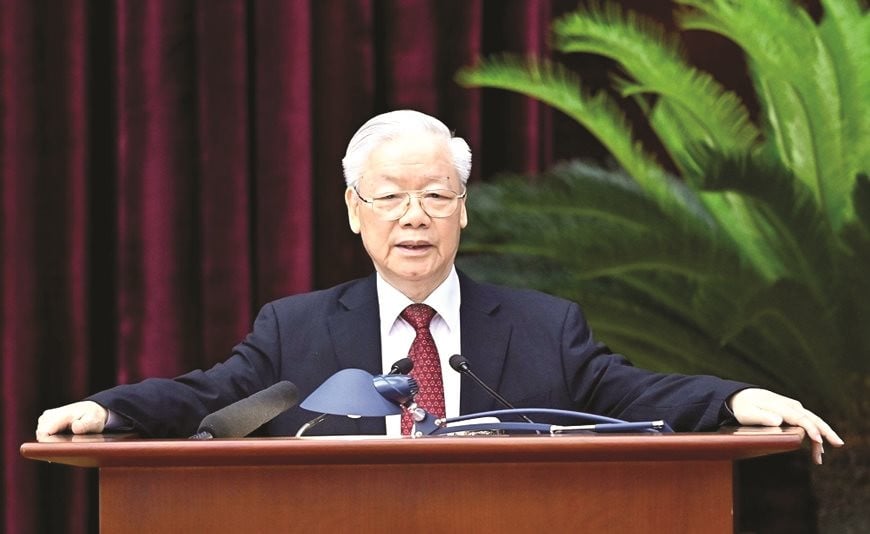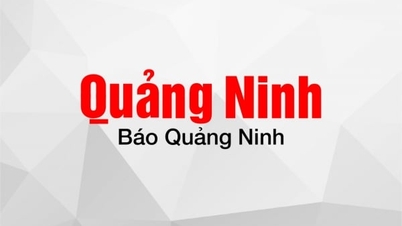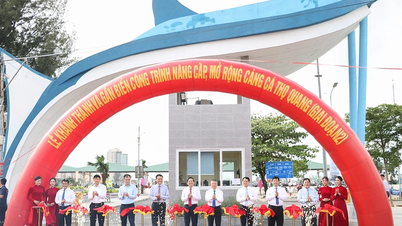During his lifetime, President Ho Chi Minh always instructed and required cadres and Party members to uphold a high sense of responsibility in the tasks and work assigned to them, whether big or small, simple or complex, ordinary or important, or confidential.
However, in reality, the tendency to avoid responsibility, shirk duty, work half-heartedly, and fear taking action is a "disease" currently present in a segment of cadres, Party members, civil servants, and public employees. Recognizing this problem and aiming to address and combat it, the Binh Thuan Provincial Party Committee has been implementing many decisive solutions.

Manifestations and causes
According to the Provincial Party Standing Committee's assessment, in recent times, cadres, Party members, civil servants, and public employees in the province have made many efforts in fulfilling their assigned responsibilities and tasks. However, in reality, there are still instances where some cadres, Party members, and civil servants in some agencies, units, and localities in the province show signs of avoidance, shirking responsibility, working half-heartedly, fearing responsibility, and being reluctant to act. This situation has impacted the socio-economic development of the province, especially after the authorities prosecuted and tried a number of former and current provincial officials related to investment projects in the province. Based on this situation, the Binh Thuan Provincial Party Standing Committee has identified several manifestations of avoidance, shirking responsibility, working half-heartedly, fearing responsibility, and being reluctant to act among a segment of cadres and Party members. For managerial leaders, the most prominent issues are a lack of proactive advice, proposals, and organization in carrying out tasks within their assigned authority and responsibility; a failure to express their own opinions in advising, directing, and handling work; a failure to fully perform their assigned duties, responsibilities, and powers; and a tendency to advise, propose, direct, and handle work based on their own subjective opinions to ensure their own safety, disregarding the bottlenecks and delays in the overall work. They lack close attention to work, fail to grasp the situation within their agency, locality, or unit; and fail to report, report late, or report dishonestly, incompletely, or inaccurately regarding the actual results of tasks under their responsibility. They also fail to prioritize the resolution of urgent issues; major, difficult, complex, sensitive, or unprecedented problems; and prominent and pressing issues related to their area of work. They seek to escalate tasks to higher authorities or transfer them horizontally to other agencies, units, or individuals when the work falls within their jurisdiction and responsibility. For cadres, Party members, and civil servants without official positions, they lack thoroughness and initiative, failing to fulfill their responsibilities; their advice and problem-solving are vague and unclear, they prioritize getting the job done quickly, prolonging the process, delaying work, and neglecting the difficult. They lack ambition and motivation, are complacent, afraid of tackling difficult tasks, afraid of making mistakes, or choose "safe" positions and fields of work with low risk and little pressure. They are passive, indecisive, and rely solely on instructions from superiors or collective decisions regarding matters within their personal jurisdiction and responsibility.
One of the reasons for this situation is that currently, the Central Government lacks specific regulations on behavior and penalties for shirking responsibility, procrastinating, working half-heartedly, and fearing accountability. Therefore, there are no measures to strictly address these behaviors. In addition, the salary system for officials and civil servants is still low compared to the general income level of society, while the volume of work to be handled and resolved at all levels, sectors, and localities is increasing, and the demands of responsibility are becoming higher, leading to many officials and civil servants resigning; a portion of officials and civil servants work half-heartedly with the mindset of "commensurate with their salary" or use working hours during office hours for personal matters and to earn extra income to alleviate the economic burden on their families. Furthermore, the heads of some Party committees, governments, agencies, and units have at times and in some places lacked determination, decisiveness, thoroughness, and sufficient focus; There is a lack of effective methods and measures for directing, managing, and organizing implementation; the role and responsibility in leading and directing the implementation of tasks have not been fully demonstrated, especially in difficult tasks with obstacles requiring high determination; and the monitoring, urging, and inspection of the work of officials and civil servants have not been carried out regularly. A portion of officials and Party members have not been truly exemplary, have not upheld a high sense of responsibility towards their work; their understanding of the Party's guidelines and policies, and the State's laws and regulations is incomplete; there are signs of ideological and political degradation, moral decay, and lifestyle deviations; fear of responsibility; lack of fortitude; temptation, and falling into individualism and material gain. The work of reviewing, evaluating, and classifying officials and Party members has sometimes been carried out seriously, with leniency, reluctance to confront issues, and a lack of genuine understanding. The capabilities and qualifications of some officials, Party members, civil servants, and public employees do not meet the requirements of their positions and jobs; they lack skills... leading to reluctance to tackle difficult tasks, avoidance, shirking responsibility, fear of making mistakes, and fear of accountability.

Serious corrective measures are needed.
To rectify and overcome the tendency of some officials and civil servants, especially leading and managerial officials, to avoid responsibility, shirk their duties, and be afraid to take action, the Provincial Party Standing Committee requests each agency, unit, and locality in the province to conduct a comprehensive review of its functions, tasks, and organizational structure according to the principle of "one task, one job assigned to one unit or individual to lead, avoiding overlap, duplication, or omission of tasks, in accordance with practical realities and current regulations." They are also required to continue reviewing, supplementing, and perfecting working regulations and procedures to ensure transparency, scientific rigor, consistency, and adherence to the Party's organizational principles and the State's laws; clearly defining and delineating responsibilities and powers between collectives and individuals, especially the head and those performing management and operational tasks. Regularly monitor, urge, and inspect the performance of official duties by agencies, units, and localities in the province, especially the responsibilities of the heads of these agencies. Strengthen inspection and supervision of the implementation of working regulations, internal rules, and regulations of agencies and units; inspect official activities, work style, and work methods… in order to promptly detect and correct organizations and individuals who show signs of avoidance, shirking responsibility, or working half-heartedly out of fear of responsibility. Focus on implementing solutions to overcome the shortage of skilled leaders, managers, and administrators who dare to think, dare to act, dare to innovate, dare to take responsibility; and those with in-depth research expertise in certain fields, and those capable of working in an international environment…; build a team of officials with sufficient qualities, capabilities, and prestige to match the tasks at hand. Resolutely and promptly replace or transfer leading officials, especially heads of departments, who do not meet job requirements, have weak capabilities, fail to strictly comply with the direction and management of superiors, violate discipline and responsibility in handling work, or allow the locality or unit to develop in a manner inconsistent with the potential, position, and investment of the province, cause internal disunity, have low credibility, are overly accommodating, receive negative public opinion and complaints, without waiting for the end of their term, appointment period, or retirement age. Strictly implement the process of conducting confidence votes for officials and the Politburo's Regulation No. 41-QĐ/TW, dated November 3, 2021, on the dismissal and resignation of officials, especially those whose prestige has declined, who no longer have the motivation to work, or who have weak capabilities.
We believe that with the solutions proposed by the Binh Thuan Provincial Party Committee, we will overcome the "disease" of avoidance, shirking responsibility, working half-heartedly, and fear of taking responsibility, thereby removing the "bottleneck" stemming from human factors so that our province can develop rapidly and sustainably.
Source














































































































Comment (0)